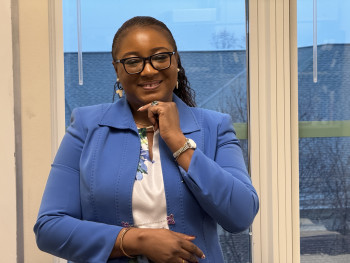Black History Lecture given by Dr. Jennifer H. Mike, Global Studies Fellow
On February 12, 2025, Dr. Jennifer Heaven Mike, Global Studies Scholar, Assistant Professor in the Women’s, Gender, and Sexuality Studies Department at DePauw University, and Hampton and Esther Boswell Distinguished University Professor of Women’s, Gender, and Sexuality Studies, delivered a keynote lecture for Black History Month. The event, hosted by the African Studies Department, explored the enduring impact of accusations on marginalized racial communities, examining how these social constructs continue to perpetuate domination, exclusion, and inequality.
Scholar, Assistant Professor in the Women’s, Gender, and Sexuality Studies Department at DePauw University, and Hampton and Esther Boswell Distinguished University Professor of Women’s, Gender, and Sexuality Studies, delivered a keynote lecture for Black History Month. The event, hosted by the African Studies Department, explored the enduring impact of accusations on marginalized racial communities, examining how these social constructs continue to perpetuate domination, exclusion, and inequality.
Titled “Deconstructing Accusation and Domination in the Africana World: Building a More Inclusive ‘Ubuntu’ Future,” Dr. Mike’s lecture offered a deep reflection on how accusations have historically been used as tools for criminalizing, stigmatizing, and dehumanizing African and Black communities. Drawing on her extensive experience as a law professor, Dr. Mike dissected the concept of “accusation,” explaining how it serves as a mechanism of societal control, reinforcing racial stereotypes, and perpetuating systemic power imbalances.
She began by tracing the role of accusations during the colonial and slavery periods, where they were weaponized to uphold racial domination. The accusation that Africans were “barbaric” or “savage” was often used to justify their enslavement and exploitation. Dr. Mike linked these historical accusations to modern-day racial profiling and the criminalization of Blackness, highlighting how Black individuals continue to face systemic oppression based on these longstanding stereotypes.
Dr. Mike then advocated for a shift away from accusatory paradigms, urging the collective adoption of Ubuntu—the African philosophy of shared humanity and solidarity—as a guiding principle to overcome racial and social divisions. She emphasized that education, cultural exchange, and the amplification of African and Black voices are essential in challenging and reshaping narratives that perpetuate exclusion.
The lecture sparked significant engagement from students, faculty, and community members. Dr. Mike celebrated the transformative power of historical resistance movements, from the abolitionist efforts of figures like Frederick Douglass to the Pan-African struggles of leaders such as Funmilayo Ransom Kuti, Kwame Nkrumah, Nnamdi Azikiwe, Nelson Mandela, Kenneth Kaunda, Robert Mugabe, and others who fought to dismantle the racialized power structures that justified colonial domination. She also highlighted the works of writers, thinkers, and activists such as W.E.B. Du Bois, Maya Angelou, Martin Luther King, Marcus Garvey, Frantz Fanon, Aimé Césaire, and Chinua Achebe, who reframed Black identity and countered the accusations of criminality, ignorance, and degradation.
In closing, Dr. Mike encouraged the audience to actively challenge narratives of accusation and focus on building a more inclusive and just future. Her powerful words resonated deeply, leaving the audience with a call to action: “How can each of us, in our respective fields and daily lives, actively challenge narratives of accusation and contribute to building a more inclusive and just world?”
This lecture was a vital contribution to the ongoing dialogue on Black history, racial justice, and collective healing. Dr. Mike’s commitment to fostering solidarity and envisioning a future where human dignity is prioritized continues to inspire those who were fortunate to attend.
Browse other stories
-
Athletics
-
Women's Lacrosse - Tigers Fall to Wooster in Heartbreaking Overtime
-
Men's Lacrosse - Tigers Take Commanding 20–4 Win Over Terriers
-
Men's Tennis - DePauw Tops Oberlin in NCAC Play
More Athletics
-
-
News
-
Greencastle Celebrates National Main Street Day with Small Business Breakfast, New Program Launch, and Spring Pitch Competition
-
Hirotsugu "Chuck" Iikubo ’57 remembered as thoughtful leader, advocate for international goodwill
-
DePauw mourns Janet Prindle Seidler ’58, founder of The Prindle Institute for Ethics
More News
-
-
People & Profiles
-
11 alums make list of influential Hoosiers
-
DePauw welcomes Dr. Manal Shalaby as Fulbright Scholar-in-Residence
-
DePauw Names New Vice President for Communications and Strategy and Chief of Staff
More People & Profiles
-
-
Have a story idea?
Whether we are writing about the intellectual challenge of our classrooms, a campus life that builds leadership, incredible faculty achievements or the seemingly endless stories of alumni success, we think DePauw has some fun stories to tell.
-
Communications & Marketing
101 E. Seminary St.
Greencastle, IN, 46135-0037
communicate@depauw.eduNews and Media
-
News media: For help with a story, contact:
Bob Weaver, Senior Director of Communications.
bobweaver@depauw.edu.